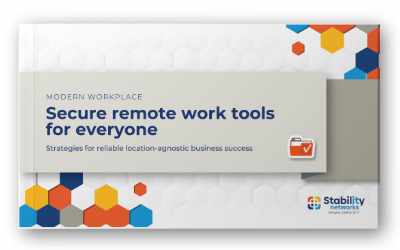With 94% of businesses using the cloud in some way, it’s become the backbone of the digital world. And why not? It’s cost-effective, provides scalability and flexibility, and is backed by reliable security. But anytime something is connected to the internet, it creates opportunities for cybercrime.
And anytime there’s an opportunity for crime and exploitation, regulatory bodies or organizations come in with rules. When a company is compliant with regulations, they’re taking the initiative to ensure their data is secure and protected, while also meeting the industry standards.
Microsoft 365 has always had an impressive list of security features built-in, as well as compliance certifications like ISO 27001 and SSAE 18. But what sets it apart from other cloud providers are the continual updates they roll out to reduce risk, increase data security, and stay ahead of evolving cyber threats.
Back in 2021, Microsoft 365 had over 50 million subscribers, so Microsoft knows that they have a lot of data in their hands. That’s why they’re continuously launching new updates and features, like the Azure Security Center, to help customers stay on top of cloud compliance.
If you’re considering a switch to M365 but you’re worried about staying truly compliant, we hope you’ll find the answers to your questions here! From data security to privacy, we’ll give you the lowdown on how Microsoft 365 is your best bet for staying compliant.
Is the Cloud a Safe Place to Store Information in a Compliance-Heavy Industry?
First, when we say compliance-heavy, we mean industries like finance, healthcare, and education. These are areas that require a certain level of security and privacy due to the nature of the data they store. And if you contract with the DoD, then of course there are CMMC and NIST 800–171 that come into play.
But even if you don’t have any contracts with the DoD, or you’re in a different industry that still requires compliance, then the cloud is still a safe place for you to store your data, as long as you take proper security measures.
Data in the cloud is usually encrypted, meaning that it’s not readable unless you have the right encryption key. This makes the cloud much safer than, for example, sharing information through email. To access your data, a cybercriminal has to hack the software that encrypts your information—which is not an easy job.
Encryption and user access make the cloud a very safe place to store data, but it’s not foolproof. That’s why cloud compliance should be such an integral part of your cybersecurity strategy—it plugs up those holes in your security.
Our favorite tool for keeping up with the ever-changing regulations? Microsoft 365. It’s simple, yet effective: it implements security policies and regular updates to keep your data safe and compliant with industry regulations. Let’s dive into why M365 is the best choice when it comes to cloud compliance.
What Features Does M365 Have For Compliance and Risk Management?
Here are a few of the most relevant controls and features for cloud compliance:
1. Encryption: All of your data gets encrypted, both on-premises and in the cloud, using AES 256-bit encryption. This makes it virtually impossible for cybercriminals to decode your data. If you have to adhere to HIPAA, CMMC, and other compliance standards, then encryption is a must.
2. Multi-Factor Authentication: Requiring multiple factors of identity verification before access is granted makes it much more difficult for hackers to gain access to your data. M365 also offers self-service password reset and a single sign-on feature, both of which make it easier for employees to access the company data securely.
3. Compliance Reports: You’ll receive a comprehensive compliance report that tracks user activity and gives you insight into any potential risks or vulnerabilities in your cloud systems. The report also helps ensure that you’re meeting all the necessary compliance standards.
4. Directory Identity Governance: So the right people have access to the resources they need, Identity Governance uses entitlement management, access reviews, privileged identity management, and terms-of-use policies. Whether malicious or not, employees have a lot of power over your data and M365 can help you stay on top of who has access.
5. Security Center: The security center provides an overview of your organization’s security posture, as well as a detailed view of the threats, such as malware and phishing attempts. It also gives you the ability to set up automated alerts that will notify you if any suspicious activities occur.
6. Data Loss Prevention: M365 also has data loss prevention (DLP) capabilities that prevent users from sharing sensitive data, such as financial information or personal health records. This ensures you are always compliant with industry regulations.
7. Defender for Business: For businesses with under 300 employees, M365 deploys a program that uses endpoint detection and response along with automated investigation and remediation to protect you from malware, phishing, ransomware, and more.
Why Is M365 Your Best Choice When It Comes to Cloud Compliance?
Microsoft employs some of the best minds in the world to identify, investigate, and fix potential cybersecurity threats. Not only do they have the resources to keep you compliant with industry regulations, but they also deploy automated security measures that are constantly monitoring and updating your systems.
However, compliance is easily overwhelming for business owners that don’t have the time (or interest) to learn all the details. And even with an in-house IT person or team, compliance can become a time-consuming responsibility. Microsoft 365 makes it as easy as possible with its recommendations and automation, but to stay continually compliant without using up a lot of your own resources, it’s smart to partner with a managed service provider.
An MSP will work with you to create a compliance strategy that’s specific to your industry and will monitor your systems around the clock. Plus, they’ll provide consulting services and help you stay up-to-date with the rapidly changing landscape of cybersecurity regulations.
Microsoft 365 is an outstanding choice when it comes to cloud compliance. Not only does it offer a wide range of features that are essential for compliance, but its powerful, automated security features help you stay protected from potential threats. And with the assistance of a managed service provider, you can ensure that your data is safe and that your customers trust you.
Easy Cloud Compliance With Stability Networks
Your data is the most valuable asset you have and cloud compliance is there to keep it safe. But that doesn’t mean you need to tackle it alone. Working with Stability Networks will give you access to cloud compliance experts that know your industry in and out—and we’ve helped hundreds of clients get the most out of Microsoft 365.
You’ll receive a custom strategy, helping you stay compliant with all the relevant regulations. Our consultants are there to make sure you save money, time, and resources. Plus, you’ll get automated monitoring and management of your systems to ensure you’re always up-to-date on the latest security threats.
Choose Stability Networks for all your cloud compliance needs and be confident that your data is safe. Schedule a consultation to start building a secure compliance strategy for your business!






